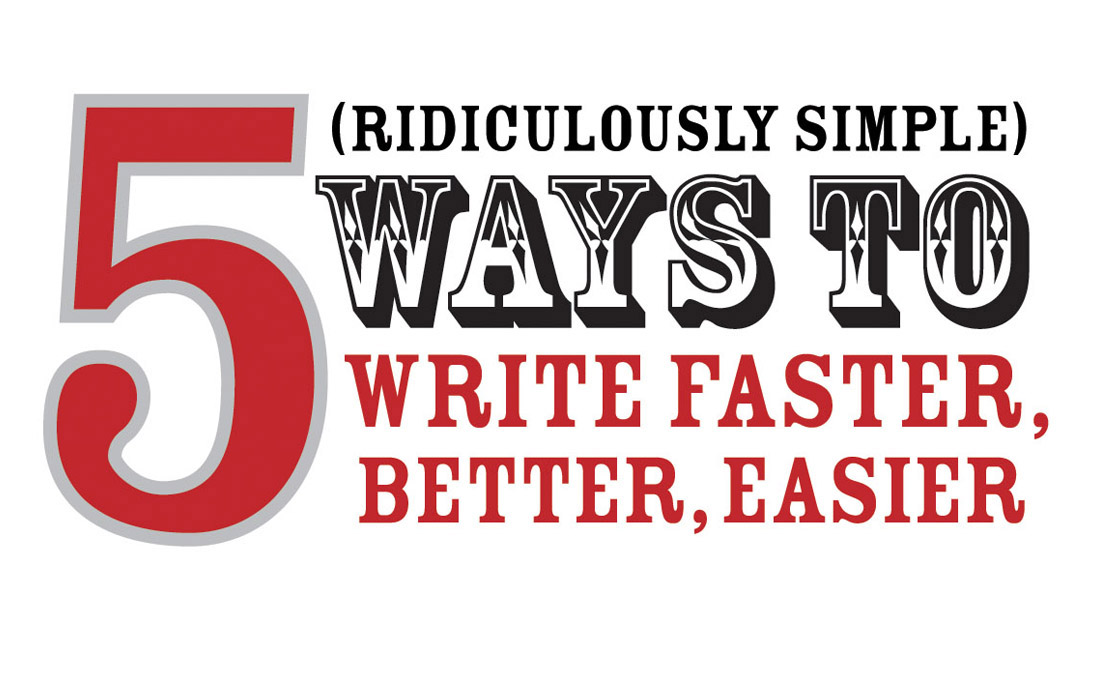Write Faster with Sporadic Writing
 Tuesday, July 6, 2010 at 08:05PM
Tuesday, July 6, 2010 at 08:05PM 
500 puzzle pieces are staring you in the face.
What do you do?
Put the puzzle together in order, top to bottom?
Or put the puzzle together sporadically?
If you’re lucky, you can start at the top and put the puzzle in order.
But, then again, you might not be so lucky.
Building your puzzle out of order, or sporadically, might be a better option
Of course, the same concept applies to writing your content. If you’re stuck writing in order, top to bottom, it’s time to play a little trick with your brain.
It’s time to write sporadically.
What do you mean, write “sporadically?”
We often associate “sporadic” to mean being “scattered,” “spotty” and “occurring occasionally.”
The Medieval Latin word “sporadic” means, “scattered like a seed” and “sow.”
This is interesting.
If we write sporadically, it means we can “scatter” and “sow” our words into our content. We don’t have to start in some magical place like the beginning. We don’t have to write in “order,” from top to bottom.
We can begin writing where we feel like writing. In other words, we can write sporadically.
Why bother writing sporadically?
Writing sporadically is liberating.
Instead of staring at the top of the page waiting for inspiration to take over, you start writing anywhere. There’s no pressure to think, “Now I have to write starting here.” You begin writing where you are moved to write; the end, the middle, the beginning.
And when you can begin writing anywhere, you have speed. You have momentum.
So how do you begin writing sporadically?
You begin writing sporadically wherever you feel the pull. Is the pull:
• In the ending?
• In the opening?
• In the three steps you want your reader to take?
If you have a rough outline of what you want to say, write what strikes you at the moment. Think “random;” there is no right or wrong place to start.
• You can write a sentence here.
• You can write a sentence there.
• Yup, you can write a sentence anywhere.
When is a good time to write sporadically?
A good time to write sporadically is when you feel sluggish, not thinking clearly or if you feel under pressure.
If it doesn’t feel orderly
You’d certainly be right about feeling that way.
If you try writing sporadically for a few weeks, you’ll discover a moment when you feel “lighter” about the demands of writing.
For example
I wrote my article “Why Precise Email Subject Lines are Like Diamonds” sporadically. I used an outline but I found myself filling in the areas here, there, and um, everywhere over time.
In summary, writing sporadically is:
1. Liberating. You don’t have to struggle with order.
2. Random. It provides your brain a bigger playground to express itself in.
3. Speedy. You write as ideas come to you.
The next time you’re stuck writing an assignment, try writing sporadically.
You just might find it easier than putting that 500-piece puzzle together.
PS. If you enjoyed this article, feel free to share it with the "Share Article" button below. Thanks.



Reader Comments (10)
Very good points you make here. It's simply amazing the words and phrases that a person can pour out of themselves by just writting sporadically. It's even more amazing how a person can basically put up a self-paralyzing wall by thinking too hard about "what am I going to write about today".
Thanks for takiing the time to share these good points!
Glad you found the post helpful. I actually ran into this problem myself a few weeks ago and decided to try something new; it worked beautifully. Now I find myself writing a bit here and a bit there more frequently and with a greater degree of success. Hats off to being sporadic! =)
Tom
Seriously, though, do you edit for flow once you've got your main writing finished or do you publish it in the order in which you wrote it? I hope this makes sense. Keep up the good work.
The flow comes from outlining first. Then I'll edit for for the "ear." By that I mean I'll read it out loud as if I were sharing a story with a friend. That's where I'll edit words and and there.
Outline. Write. Talk.
That's my formula. =)
Tom
Yes, sometimes just starting to write can be pretty difficult. Give yourself permission to start writing anywhere and then watch your results zoom!
Tom
Nice post. In addition to helping w/ my writing, I find this approach also works really well for me when I'm editing film or video. I'll often have a strong visual image ('the pull') and wind up starting w/ that - it could be the opening, a certain sequence or scene or the close of the project. I almost never work linearly - I've found if I fight that pull to work on a certain area I just wind up spending a ton of energy avoiding what I was feeling naturally and then things start to feel forced. Trouble.
Regarding tools used, I wonder what you and others are using. <Warning: Mac-only apps ahead> In the cases where I know I have distinct 'buckets' of topics, I'll usually do a quick list in TextEdit and then start w/ indented sub-topics. But when I'm in a sort of 'globule idea' state, I try to go w/ more abstract tools to keep me on a creative level. Some of the ones I like are Curio for its free-form writing (almost as good as OneNote for Windows), Scrivener as a great overall writing app useful for larger projects, and MindManager for mindmapping (it's better for PC but still OK for Mac).
These tools require the added step of translating to a client-ready doc (w/ the exception of Scrivener) but I find the looseness really helps me go w/ whatever I'm pulled into at the moment.
Tony
Like you, I rarely worked linearly in video, too. Of course, I remember the days 25 years ago when you HAD to work linearly– going back to rework things was a pain. :)
I haven't used the tools you mentioned but I do create mindmaps manually. I frequently use freewriting to bust through the other side. If you're stuck, freewriting is one the quickest ways to generate new ideas. Read my interviews with Mark Levy, author of "Accidental Genius." His techniques are truly powerful.
Thanks for swinging by. =)
Tom
Oh yeah - freewriting is something I do every day. I just never realized it had a name other than 'ok, let's see what comes out of my directed typing rant today.' :)
Nice interview w/ Mark, btw.
Cheers,
T